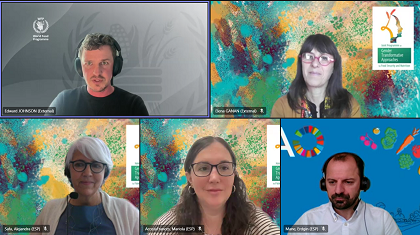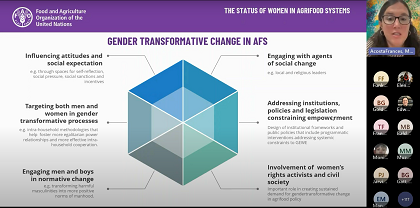WFP gender equality brown bag session: "From gender sensitive to gender transformative”
28 JUNE 2023

FAO's recently published Status of Women in Agrifood Systems report shows how increasing women's empowerment and gender equality in agrifood systems enhances women's well-being and that of their households, creating opportunities for economic growth, greater incomes, productivity and resilience. It reflects a shift from seeking to address the symptoms of gender inequalities to understanding and challenging their root causes through gender transformative approaches.
In a blog post, LSE Professor Naila Kabeer highlights the emphasis placed by the FAO report “on the importance of the intangible conditions that promote empowerment”, welcoming its focus on the constraints that create gender gaps and constitute the deeper, underlying causes. She explains that interventions do not simply involve a transfer of material resources from programmes to recipients but are about a more complex process of transforming “mindsets and relationships”.
This message is backed up by learnings of the EU-RBA Joint Programme on Gender Transformative Approaches for Food Security and Nutrition (JP GTA), implemented by FAO, IFAD and WFP in collaboration with and through financial support from the European Union.
To draw attention to the importance of gender transformative programming, WFP in the framework of the JP GTA focused one of its monthly 'Gender Equality Brown Bag' sessions in June 2023 on key data emerging from FAO’s report and on the potential of innovative approaches to trigger gender transformative change in agrifood systems.
WFP’s monthly Gender Equality Brown Bag sessions provide a platform for knowledge and experience sharing between WFP offices, aiming to boost internal awareness among staff of gender gaps and available tools to enhance gender equality in the organization’s work.
During the virtual event, titled “From gender sensitive to gender transformative: learning from FAO's 'Status of Women in Agrifood Systems'”, two of the report’s authors were invited to present key findings. WFP’s technical representative to the JP GTA then went on to introduce the Joint Programme and share examples from its work in Ecuador and Malawi.
Speakers highlighted that the discriminatory social norms and rules affecting women and girls in agrifood systems are at the heart of gender inequalities and very slow to change. However, FAO’s report underscores that gender transformative approaches can be cost-effective and successful in changing discriminatory norms at the local level.
Gender transformative approaches have shown positive results across different domains of agrifood systems, for instance by shifting the norms related to women’s empowerment and their involvement in agriculture. Amongst other things, gender transformative approaches can enhance women’s self-worth, their negotiation capacities with their partners, their decision-making in households, and their access to cash-crop income.

The report also lists some of the key elements that are important to achieve gender transformative change in agrifood systems. These include influencing attitudes and social expectations, targeting both men and women in gender transformative processes, and addressing institutions, policies and legislation constraining empowerment. Finally, the evidence shows that it is important to engage with men and boys, with agents of social change, and with women’s rights activists and civil society.
For each of these elements, the Rome-based Agencies offer a range of examples of how they are being implemented in practice under the framework of the Joint Programme.
To learn more about the JP GTA, visit https://www.fao.org/joint-programme-gender-transformative-approaches/en.
Contact:
- Fiona Funke, Knowledge Management & Communication Specialist, JP GTA: [email protected]
- JP GTA: [email protected]




